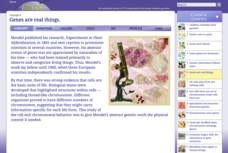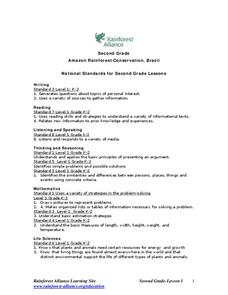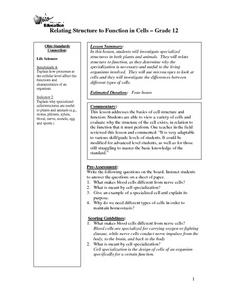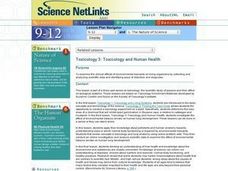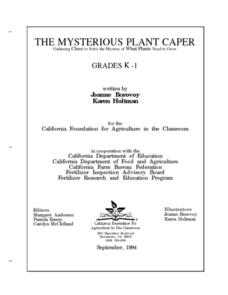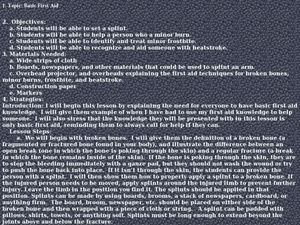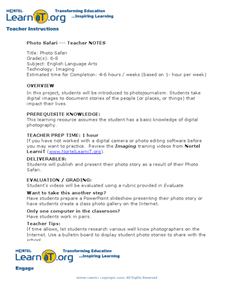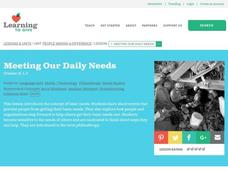Cold Spring Harbor Laboratory
Genes Are Real Things
Proving microscopic structures exist is a difficult task. Learn how scientists did just that in the mid-1800s as they set out to identify the cellular structures related to genetics. The online lesson explains the collection of work that...
Science Matters
Lotusland
It's time for a field trip! Scholars take their new-found knowledge of adaptations and seed dispersal on a field trip to a local botanical garden. They gain an up-close look at how ecological interdependence works in a distinct...
Curated OER
Wonderful Worms
Students identify living and non-living things and explain the importance of earthworms to the soil. They name some basic facts about earthworms, recognize basic worm vocabulary words and demonstrate vermicomposting techniques.
Curated OER
What Is Life?
In this life characteristics worksheet, students answer 16 questions about living things, Redi's experiment, basic needs, growth and development.
Curated OER
Plants, Animals and Our Environment
Students draw and label the basic needs of animals. They draw and label the basic needs of plants. Students understand the basic needs of plants and animals are not only the same, but are interrelated. They know that the environment...
Curated OER
Animal Names
Students match animal pictures with animal words. In this farm animal lesson, students put together the parent and their offspring. Students should have prior knowledge of the basic needs of animals. Students write animal booklets.
Pennsylvania Department of Education
Animal Classes and Their Ecosystems
Students explore animal characteristics by participating in an environment identification activity. In this animal habitat lesson, students discuss a range of different wild life and the ecosystems that they are a part of. Students view...
Curated OER
My Little Seed House
Second graders explore plant life by participating in a germination activity. In this botany lesson, 2nd graders read several books about seed germination including Sunflower House and Tiny Seed. Students identify the necessary elements...
Curated OER
Amazon Rainforest Conservation, Brazil
Students explore rain forests. In this rain forest lesson, students participate in a "BioBlitz" of their schoolyard, observing and recording every living thing in a designated area. Students visit websites about rain forests to...
Curated OER
Clay Ants: Insect Anatomy
Students examine anatomic structures in order to identify insects from other living organisms. They gain a level of comfort from anxiety when observing and handling live and pinned insects. They create clay models of an insect.
Curated OER
What Is It?
Play the game of Tag and differentiate between plants and animals. Explore the characteristics of plants. Identify the major parts of plants (e.g., seeds, stem, pistil) and describe their basic functions. Compare the requirements of some...
Curated OER
Relating Structure to Function in Cells
Twelfth graders investigate specialized structures in both plants and animals. They relate structure to function, as they determine why the specialization is necessary and useful to the living organisms involved. They use microscopes...
Curated OER
Toxicology And Human Health
Students examine the clinical effects of environmental toxicants on living organisms by collecting and analyzing scientific data and identifying ways of detection and diagnosis.
Curated OER
The Mysterious Plant Caper
Students investigate the basic parts of plant and that plants are living things which require water, air, light and nutrients for survival. They do this through a series of scientific experiements and multi-curricular hands-on activities.
Curated OER
People making a difference
Pupils identify resources that all humans need and compare needs and wants. In this needs and wants lesson plan, students discuss with their teacher situations in which people need or want items and how some people don't have the...
Curated OER
Help the Duck Find Her Babies
Learners study the basic need for animals to attract mates and reproduce young.
K12 Reader
Bartering for Basics
A passage about bartering practiced by early Native American tribes provides the text for a reading comprehension worksheet that asks kids to use information from the article to answer a series of comprehension questions.
Curated OER
Wild Thing!
Sixth graders view several segments of the video, "How Animals Survive." They discuss elements of survival. Students list living and nonliving things found in their backyards and schoolyards. Students work in groups to complete the...
Curated OER
Fossil Kit I - Lesson Plan
Here is a 14-page lesson plan that deftly outlines a wonderful educational experience for your youngsters. In it, learners learn about a variety of animals that have left behind clues of their existence in fossil form. Many excellent...
Curated OER
Basic First Aid
Learners listen to basic first aid information. In this first aid lesson plan, students discuss CPR, Choking, Severe Bleeding, and Shock. They research the steps and how they can help in an emergency situation.
Curated OER
Photo Safari
Students take photographs of people and things that impact their lives. In this photojournalism lesson plan, students learn how to use a photo to tell a story and present their project.
Curated OER
People Making a Difference
Students research the idea of basic needs, study philanthropists in their community, and think about ways to help others receive basic needs. In this needs and philanthropy lesson, students brainstorm about basic needs. Students use...
Outdoor Learning Center
Outdoor Survival
Which of the following can you survive without for the longest time: water, food, or a positive mental attitude? The answer may surprise you. Guide learners of all ages through games, activities, and discussions about surviving in the...
National Wildlife Federation
What's Your Habitat?
How are third graders like rabbits? They both live in habitats and require food, water, and shelter to survive! An educational science lesson encourages your learners to think about their own habitats and survival needs, before comparing...


